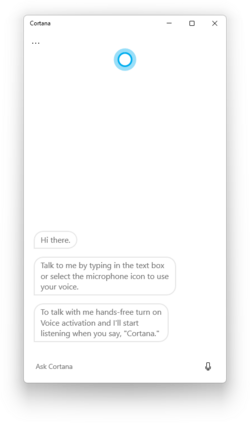Cortana
| Component of Microsoft Windows | |
 Cortana in Windows 11 | |
| Introduced in | Windows Phone 8.1 Windows 10 |
|---|---|
| Replaced by | |
| Copilot | |
Cortana was a virtual assistant developed by Microsoft. It was first introduced with the release of Windows Phone 8.1 in April 2014, and was later integrated to desktop Windows with the release of Windows 10 in July 2015. Cortana would later be released on iOS and Android in December 2015 and on the Xbox One as part of a major dashboard update in July 2016.
Cortana was integrated with Microsoft's Bing search engine and performed tasks such as setting reminders and answering questions for the user. It accepted both text-based and voice-based input. It is named after a character in the Halo video game franchise.
Cortana was integrated into Windows 10's search box until Windows 10 May 2019 Update in which Cortana was separated into its own button and flyout. Cortana would later be completely decoupled from the Windows shell in Windows 10 May 2020 Update in favor of a UWP app which features an updated chat-based interface as part of downplaying Cortana as a virtual assistant. Cortana was removed from the Xbox One in 2019 and the Cortana mobile apps would later be shut down in March 2021. It would later be removed from the OOBE in Windows 11 and has been removed from the taskbar.
On 2 June 2023, Microsoft announced that support for the standalone Cortana app for Windows 10 and Windows 11 would end in late 2023 in favor of Bing Chat AI and Windows Copilot.
Development[edit | edit source]
Implementation[edit | edit source]
Cortana was introduced in Windows Phone 8.1 as a virtual assistant. Later, it was ported to Windows 10 build 9821 as an integrated function into Search. Since Windows 10 May 2020 Update, Cortana has become a standalone app, which allows easier updating.
Discontinuation[edit | edit source]
In 2023, Microsoft announced that Cortana would be deprecated[1] and replaced by Windows Copilot, another virtual assistant based on the GPT-4 language model developed by OpenAI. As a result, the application is no longer included in later Windows 11 versions, and most of its functions that rely on key Bing functionality no longer work.
Gallery[edit | edit source]
Cortana in Windows 10 build 9821
Cortana in Windows 10 build 9900
Cortana in Windows 10 2022 Update




